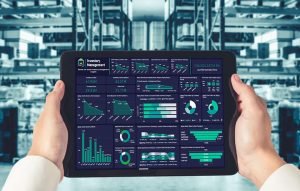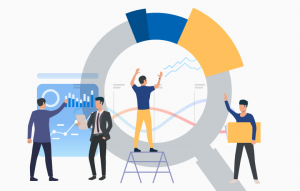Businesses often struggle with managing and interpreting vast amounts of complex data. This is true for even the renewable energy sector. This challenge hinders their ability to identify patterns, track performance metrics, and make informed decisions swiftly. Without effective data visualization, forecasting energy production, monitoring equipment health, and optimizing resource allocation become difficult, leading to inefficiencies, higher costs, and missed opportunities for sustainable advancements.
Hence, renewable energy companies are increasingly turning to advanced data analytics to optimize operations, enhance decision-making, and drive innovation. One of the key tools facilitating this transformation is Tableau. With real-time analytics and interactive dashboards, Tableau AI powered dashboard services empower energy companies to swiftly identify trends, monitor performance, and drive strategic initiatives.
This blog explores real-world use cases where leading renewable energy companies have successfully implemented the Tableau platform, illustrating the transformative impact of data culture on their operations. From improving energy production forecasting to optimizing maintenance schedules and enhancing stakeholder communication, these examples highlight how Tableau dashboard for renewable energy is revolutionizing the sector.
Let’s explore Tableau use cases and see how it is empowering the energy sector:
1. Finnish energy company Leppäkosken Sähkö enhances reporting efficiency with Tableau
Leppäkoski is a dynamic energy company in south-west Finland, offering a range of solutions, including electricity, district heat, natural gas, and other energy services.
They faced significant challenges in their reporting processes as they expanded their business. With growing production and revenues of $70 million, the company struggled to manage data effectively, relying on manual reporting methods that were time-consuming and inefficient.
Seeking a solution, the company implemented Tableau for visualizing data. The adoption of Tableau analytics allowed the company to analyze data more creatively and flexibly, reducing report preparation time from weeks to days or hours.
Integrating AI-powered Tableau Desktop and Server standardized reporting and provided comprehensive insights by combining data from energy production, customer meter readings, billing, and customer service systems, all in a Microsoft SQL-based data warehouse.
Tableau’s AI-driven visual reports revolutionized data analysis, enabling swift trend spotting, opportunity identification, and informed decision-making for management and business units. Real-time reporting facilitates rapid month-end report generation, empowering them to uncover insights, cut costs, and boost business growth.
Leppäkoski has gained the following benefits of implementing AI-powered Tableau dashboard for renewable energy:
- Improved sales-performance analytics
- Better customer-satisfaction reporting
- Optimizing energy production
- Planning for the future
2. ENGIE enhances data-driven decision making with Tableau
ENGIE, a leading supplier of natural gas and green electricity in France, has significantly strengthened its position as a responsible energy supplier by leveraging Tableau’s data visualization capabilities. They are committed to accelerating the transition towards a carbon-neutral world, through reduced energy consumption and more environmentally friendly solutions.
They wanted to make data-driven decisions enabled by machine learning (ML) and manage business operations more effectively and aimed to fully capitalize on its data assets to enhance service efficiency. Their residential customer division in France adopted Tableau following a competitive tendering process.
By transitioning to Tableau, they can use ML for insightful decision-making, significantly reducing the development cycle of visualizations from three months to just two weeks.
Tableau implementation services have revolutionized ENGIE’s data analysis and visualization processes, making them indispensable to the company’s operations. With the ability to develop intuitive and interactive dashboards, ENGIE has improved real-time monitoring of solutions and projects, enhanced customer satisfaction and streamlined digital journeys.
ENGIE has experienced several advantages by deploying Tableau:
- Fostered a data-driven culture
- Better monitoring and managing customer solutions, contracts, and satisfaction
- Drive continuous improvement
- Maintain its competitive edge in the energy sector
3. Origin transforms data management and strategy with Tableau
Origin is a leading Australian energy company serving over 4 million customers. They are dedicated to making energy affordable, sustainable, and smarter while aiming for net-zero emissions by 2050 and supporting community empowerment through education initiatives.
Their employees relied heavily on Excel for data operations, which often resulted in duplication of effort and inconsistency in reporting. The lack of real-time reporting impeded timely business decisions.
Origin adopted Tableau on an enterprise-wide scale. The initial adoption began with an expert group of analysts using Tableau’s AI-powered dashboard services. This quickly demonstrated its power in manipulating and drilling down on complex data. This success led to the adoption of Tableau Server, now with 1,700 users on the cloud.
Tableau’s unified dashboards have enabled Origin to:
- Perform comparative analysis at the speed of thought, shifting the company’s focus from manual data compilation to strategic planning and forecasting.
- Explore untapped data sources and create new information assets, enhancing overall business efficiency.
- With AI-driven self-service analytics now accessible to business users, the BI team can focus on big-picture data exploration, significantly improving decision-making processes.
Cultivating AI-driven culture in renewable energy with Tableau
Leveraging Tableau for data solutions in the renewable energy sector can be a transformative move towards fostering a data-driven culture. Tableau integration services provide real-time data access and intuitive reporting. This helps teams across all levels to engage with and interpret data, driving innovation and continuous improvement. As the renewable energy sector continues to grow and evolve, adopting Tableau will be crucial for companies aiming to lead in this dynamic and competitive market, ensuring they remain agile, responsive, and ahead of the curve.









